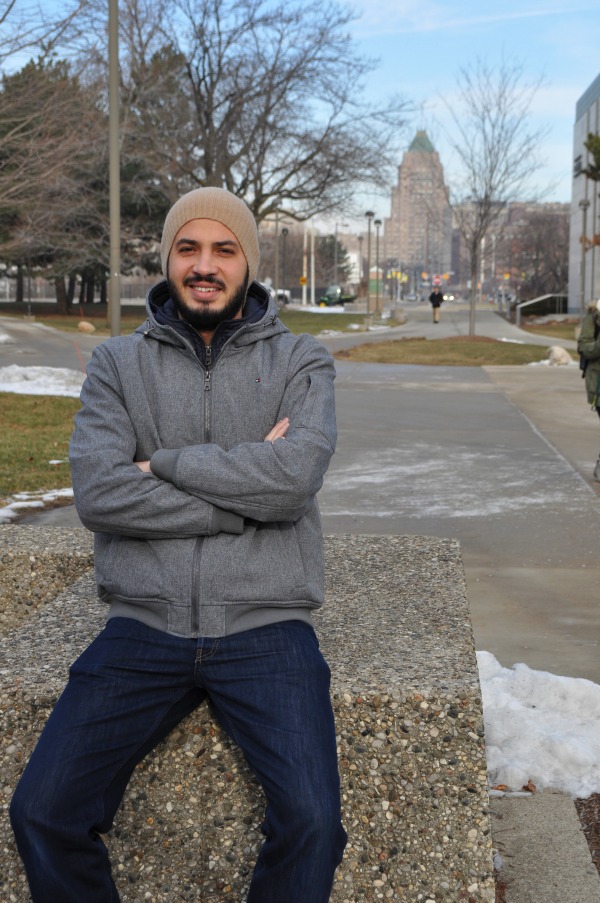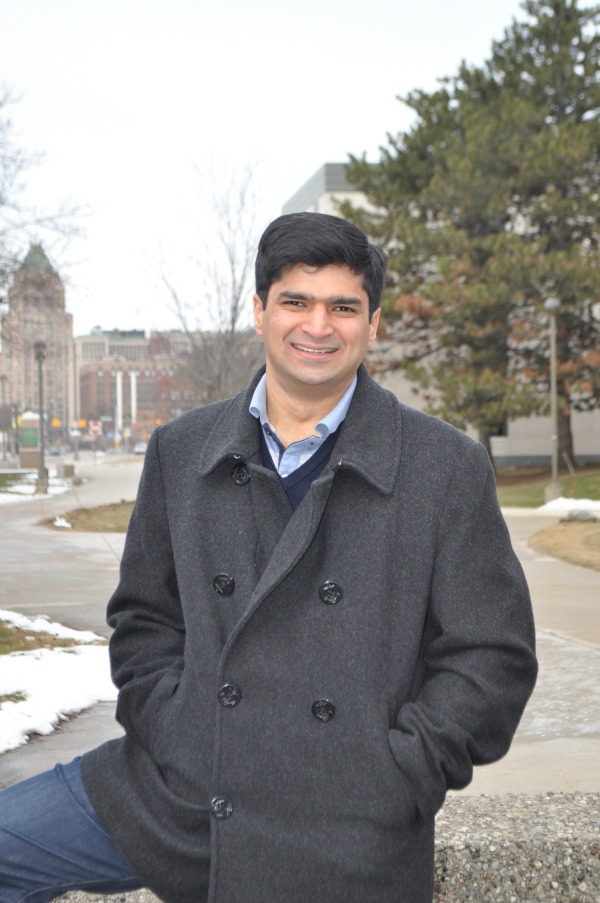 In the late 1990s and early 2000s, Wayne State University was enjoying a boom in international student enrollment, with approximately 10 percent of its students coming from outside the U.S., and a market share that placed the university in the top 25 nationwide. Students around the globe were attracted to Wayne for many reasons including its educational and research reputations, and opportunities in the auto and other industries.
In the late 1990s and early 2000s, Wayne State University was enjoying a boom in international student enrollment, with approximately 10 percent of its students coming from outside the U.S., and a market share that placed the university in the top 25 nationwide. Students around the globe were attracted to Wayne for many reasons including its educational and research reputations, and opportunities in the auto and other industries.
Then came 9/11, and a national recession that saw the Big Three automotive companies struggling for survival. Suddenly, Wayne found itself among many universities across the country seeing a sharp decline in the number of students who wanted to venture overseas to study in the U.S.
“We were a destination for international students because they could easily get jobs, particularly in the auto industry. We did very little in the way of international recruiting,” says Ahmad Ezzeddine, CLAS ’90, M.B.A. ’93, Ph.D. ’06, associate vice president for Educational Outreach and International Programs and senior associate to the president for Strategic Planning and Special Initiatives. “This changed after 9/11 and the economic troubles that affected the auto industry. The reputation of Detroit during that period did not help either.”
But now, with Detroit in the midst of revitalization, the nation’s economy on the rebound and the Big Three auto companies enjoying the most prosperous time in their histories, Wayne State is expanding efforts to again be a top destination for international students. Wayne’s State’s Office of International Programs is leading the university’s global engagement through a global/international agenda with four main goals: increasing and diversifying the international student body, internationalizing the curriculum, increasing student and faculty global mobility, and enhancing Wayne’s global profile.
“For more than five years now, we have been pursuing an international recruitment strategy that is focused on specific international markets, and includes participating in recruiting fairs, developing partnerships with universities in our target countries, and engaging directly with students and government organizations in those markets. Our numbers have steadily increased and we are now more diverse than before,” says Ezzeddine, himself once an international student who came from Lebanon.
Wayne currently hosts students from government-sponsored programs in Kuwait, Mexico, Oman, Saudi Arabia and Brazil; the largest numbers of international students come from the latter two countries, along with India, Canada and China. Engineering and sciences degrees are the most sought after by international students, while demand for business degrees is growing, according to Ezzeddine.
Mohamed Kilani (pictured above) is a good example of just the type of international student Wayne State is working to recruit. Kilani, 28, is a Fulbright Scholar who came to Wayne from Tunisia in fall 2015 to pursue his master’s degree in materials science and engineering. Kilani, who earned his bachelor’s degree from the National Engineering School of Sousse in Tunisia, chose Wayne State after being selected for the Fulbright Foreign Student Program, which enables graduate students, young professionals and artists from abroad to study and conduct research in the U.S. He is one of only two Tunisian students enrolled at Wayne.
“I chose Wayne State based on the faculty members and their work, and the fact that the chemical and materials science programs are among the most well-regarded in the country,” Kilani says.
Ezzeddine says international students often cite Wayne’s excellent academic programs and the fact that it’s a comprehensive research university in a diverse, urban setting as reasons for choosing the school.
 Aditya Arvind Hippalgaonkar, 30, (pictured right) arrived in Detroit from India in January 2015 to pursue his master’s degree in accounting. He says he chose Wayne State because its Detroit location would offer more opportunities than a college in a smaller town, and enjoys the fact that professors here are more approachable and less formal than back home. “Here you are made to think outside the box, whereas at home it’s all problem-solving,” says Hippalgaonkar, who already has a postgraduate job lined up in Detroit. “In India, everything is spoon-feeding. Here you can do things on your own, which is more challenging.”
Aditya Arvind Hippalgaonkar, 30, (pictured right) arrived in Detroit from India in January 2015 to pursue his master’s degree in accounting. He says he chose Wayne State because its Detroit location would offer more opportunities than a college in a smaller town, and enjoys the fact that professors here are more approachable and less formal than back home. “Here you are made to think outside the box, whereas at home it’s all problem-solving,” says Hippalgaonkar, who already has a postgraduate job lined up in Detroit. “In India, everything is spoon-feeding. Here you can do things on your own, which is more challenging.”
Kilani says he’s also enjoyed the looser structure at Wayne State compared to school in Tunisia. “Here you can choose courses. In my country you have a fixed program. For someone like me, who knows what they want to do, it’s good,” he says.
Ezzeddine says two of the biggest challenges in recruiting foreign students are cost and pre-conceived notions about Detroit. “Despite all the positive news about Detroit, we still find ourselves needing to explain that Detroit and Wayne State are safe places,” he says.
Both Hippalgaonkar and Kilani admit they knew very little about Detroit before coming here — and what they did know made them somewhat wary.
“Because it is my first time coming to the U.S., I’ve become very enriched from a cultural point of view. We learn how Americans live from watching TV, but that is not the truth,” Kilani admits.
Both students say they’ve enjoyed living on campus, and visits to local museums, restaurants and sporting events. Kilani also spent Thanksgiving, eating and watching “American football,” with Jaclyn Assarian, associate director of the Office of International Programs and Fulbright coordinator, and her family.
“Her family was amazing,” he says. “I heard in the beginning Detroit is a very scary place, but I discovered it is very good here, with nice people.”
Kilani says his experience with Assarian’s family, who are Aremenian, has mirrored his larger experience at Wayne, where he’s made friends from India, China, Libya, Saudi Arabia and Oman. According to Ezzeddine that type of experience illustrates why it’s so important for the university to recruit international students.
“[International students] are representatives of their countries on campus,” Ezzeddine says. “They bring with them aspects of their culture, their language, their food, their traditions that would be very valuable for our students to experience. Their presence is also valuable in the classroom, as they bring with them a diversity of thinking and learning, and provide the opportunity to create in the classroom a microcosm of the settings that graduates may encounter in their work setting, particularly at companies with global operations.”
Kilani says from what he’s experienced, Wayne State’s global efforts are succeeding. “It is very international, especially on campus,” he says. “Many students and professors are from other countries. You see and hear many languages, religions and cultures. It’s like a small world.”
